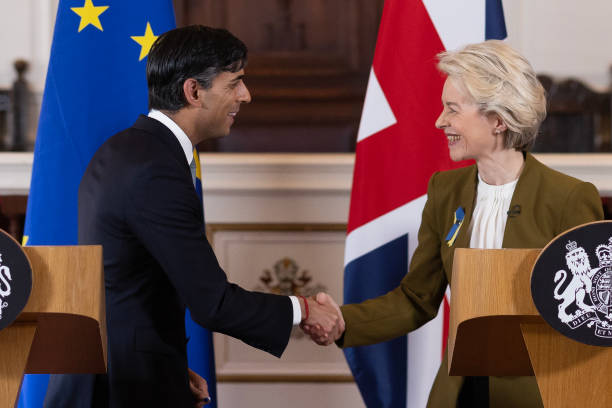Sunak’s Northern Ireland deal is a foundation stone for a better relation with the EU

Rishi Sunak’s deal for Northern Ireland is an achievement. The positive relationship between the PM and Ursula von der Leyen, moreover, is a stepping stone for the EU-UK relationship, writes Rory O’Donnell
It has finally happened: the EU and the UK have reached a deal on the Northern Ireland protocol. Almost as important as the content of the deal is the positive relationship that has grown between prime minister Rishi Sunak and the president of the European Commission, Ursula von der Leyen. Previous prime ministers had much more rocky relationships with their European counterparts, and it made it much harder to build momentum behind negotiations. The Northern Ireland protocol has always been both a political and a technical problem; getting the politics right has made it easier to find technical solutions. This bodes very well for future cooperation between us and our European partners.
The new deal means Northern Ireland and its businesses now have access to both the UK and the biggest single trading block in the world, the EU. This has the potential to deliver much needed economic growth, and puts Northern Ireland in a unique position as a destination for inward investment. A key target for this could be the United States. They have been watching developments on the protocol very closely and played a key role in the Good Friday Agreement twenty-five years ago. The framework could open up opportunities for US companies wanting to expand into Europe, with Northern Ireland a perfect place to consider.
The effective removal of the trade boundary down the Irish Sea will also make it easier for businesses in the rest of the UK to trade with Northern Ireland. This easing of trading conditions will help address one of the most significant impacts of the protocol: shortages of some products in Northern Ireland’s supermarkets.
Two smaller but equally visible problems solved by the framework are the removal of any restrictions on people taking their pets to and from Great Britain and Northern Ireland and the removal of the restriction on sending seed potatoes from Scotland to Northern Ireland, an important issue for farmers in the province.
Another key benefit will be the removal of the block on the UK joining the Horizon programme, the EU’s key funding programme for research and innovation. The EU had been very clear on this point: progress on our accession to this programme was dependent on progress being made on the protocol. The British research and innovation community have played a very significant role and secured real benefits from their participation in equivalent programmes in the past – so this is great news for the whole sector.
Of course, business confidence needs political stability. The reaction of politicians in both Northern Ireland and Westminster will be important. But Rishi Sunak has already taken considerable steps to address many of the concerns raised by politicians in Belfast and London.
The “Stormont break” goes some way to addressing concerns about the democratic deficit, enabling members of the Northern Ireland Assembly to raise concerns about new pieces of EU legislation that have a demonstrable adverse impact on the ground in Northern Ireland. In turn, this enables the UK to seek solutions to these problems with the EU before any new rules need to be implemented. This is a significant move by the EU, and it is matched by the recognition on the UK side that having access to the EU single market for Northern Ireland is a significant benefit that brings with it some responsibilities.
In all, the deal, to be known as the Windsor Framework, went further than many people had anticipated. It is clearly a significantly better deal than the one originally negotiated. If anything, it deals with specific problems caused by its predecessor but also strikes a much better balance between protecting Northern Ireland’s place in the UK and protecting the EU single market. The positive relationship between the PM and the commission president was a key factor in this. It has the potential to drive real economic growth in one of the poorest parts of the UK and marks a significant improvement in relations between the UK and the EU, something which bodes well for future cooperation between the two.
In short, this is an opportunity that shouldn’t be missed.
For all the latest Lifestyle News Click Here
For the latest news and updates, follow us on Google News.

